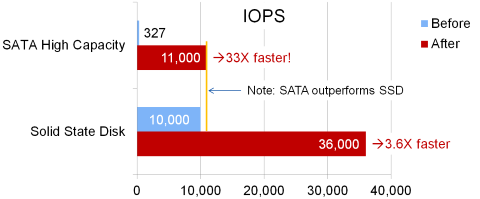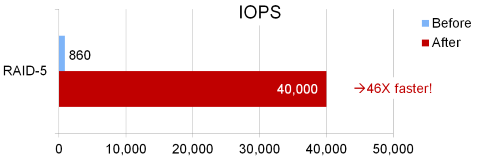Workloads such as databases often generate random write operations. These types of operations are the most expensive that can occur within a storage system and always result in a negative performance impact. This impact not only affects magnetic storage devices (HDD), but flash-based (SSD) devices as well. DataCore’s Random Write Accelerator is a mechanism within SANsymphony that organizes all inbound writes into a sequential pattern, therefore eliminating the penalties associated with random write operations.
In the case of HDD, when random write data is received, a significant amount of time is spent repositioning the write heads over the correct media location. Once the location has been found, additional time is spent modifying the area of the disk with the new data. DataCore’s Random Write Accelerator can’t eliminate the need to write the data, but it does eliminate the need to reposition the heads for every random write operation, greatly improving performance.
In the case of SSD, random write operations cause internal fragmentation to occur. This fragmentation leads to increased garbage collection which causes even more writes to occur within the SSD (write-amplification). The result is significantly decreased performance and shortened device lifespan due to wearing.
DataCore’s Random Write Accelerator provides significant performance improvement for HDDs and SSDs as shown in the following graphic:


* DataCore cache in use for before and after scenarios. IOmeter test: 100% write, 100% random workload with a 4K block size and 64 I/Os outstanding.
Feature Highlights Summary
- Achieve SSD-like performance from lower cost HDD in random-write intensive workloads
- Significantly improves performance for SSD for random write workloads
- Enabled on a virtual disk basis
- Minimizes stress of magnetic storage devices
- Minimizes fragmentation and extends life of SSDs